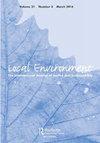运输:挑战残疾环境
IF 2.4
3区 环境科学与生态学
Q3 ENVIRONMENTAL STUDIES
引用次数: 54
摘要
本文通过考察交通的作用,将环境和残疾运动的关注结合在一起。这两个运动都批评当前的交通政策和实践。残疾人运动分析了它是如何将残疾人的需求边缘化的,而环保主义者则认为,目前的交通趋势是不可持续的,并将替代方案边缘化。虽然这些批评是独立的,甚至似乎是相互对立的,但通过扩展残疾的社会模式,可以制定一个共同的议程。社会模型可以用来理解,汽车主导的交通系统如何被理解为残疾人群,而不是传统上被认为是“残疾”的人群。汽车提供了技术上的修复,使能力,特别是速度和力量,但在实践中,在许多方面禁用。城市扩张和交通增加了许多“健全”和“残疾人”参与和进入的障碍,而汽车的主导地位损害了社会互动并限制了感官知觉。此外,汽车经济是导致撞车和缺乏运动的主要原因。综合理解这些需要将残疾的社会模型与损害的生态社会模型结合起来。这可以显示不平等的社会组织形式如何体现在人和环境中,从而产生损害、残疾和不利的模式。最后,我们建议制定政策,朝着可持续发展的社会迈进,为更广泛的社会参与提供更多机会。文章认为,这两种运动可以创造并受益于社会包容、低能耗、可持续交通的共同愿景。本文章由计算机程序翻译,如有差异,请以英文原文为准。
Transport: challenging disabling environments
This article brings together the concerns of environmental and disability movements through examining the role of transport. Both movements critique current transport policy and practice. The disability movement has analysed how it marginalises the needs of disabled people, while environmentalists argue current transport trends are unsustainable and marginalise alternatives. Although these critiques operate independently and even seem opposed to each other, a common agenda can be developed through extending the social model of disability. The social model can be used to understand how car-dominated transport systems can be understood as disabling populations larger than those conventionally recognised as “disabled”. The car offers the technological fix of enabling abilities, in particular speed and strength, but in practice disables in a number of ways. Urban sprawl and traffic increase barriers to participation and access for many both “able-bodied” and “disabled”, while car dominance damages social interaction and limits sensory perception. Furthermore, the car economy is a major cause of impairment through crashes and physical inactivity. Understanding these together requires integrating the social model of disability with an eco-social model of impairment. This can show how unequal forms of social organisation are embodied in people and environments to produce patterns of impairment, disability and disadvantage. Finally we suggest policies to move towards sustainable societies with increased opportunities for broader social participation. The article argues that the two movements can create and benefit from a shared vision of socially inclusive, low-energy, sustainable transport.
求助全文
通过发布文献求助,成功后即可免费获取论文全文。
去求助
来源期刊

Local Environment
Environmental Science-Management, Monitoring, Policy and Law
CiteScore
4.10
自引率
4.20%
发文量
88
期刊介绍:
Local Environment: The International Journal of Justice and Sustainability is a refereed journal written by and for researchers, activists, non-governmental organisations, students, teachers, policy makers and practitioners. Our focus is specifically on sustainability planning, policy and politics in relation to theoretical, conceptual and empirical studies at the nexus of equity, justice and the local environment. It is an inclusive forum for diverse constituencies and perspectives to engage in a critical examination, evaluation and discussion of the environmental, social and economic policies, processes and strategies which will be needed in movement towards social justice and sustainability - "Just Sustainabilities" - at local, regional, national and global scales.
Please note that we only accept submissions that share our focus. Based on critical research and practical experience, we are particularly seeking submissions from nations and continents representing different levels of income and industrial development and from countries in transition in order to engage in mutual learning and understanding.
 求助内容:
求助内容: 应助结果提醒方式:
应助结果提醒方式:


